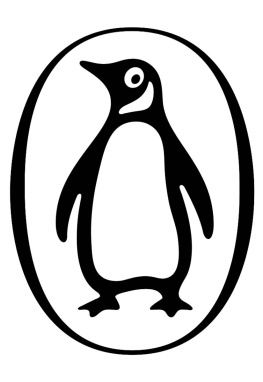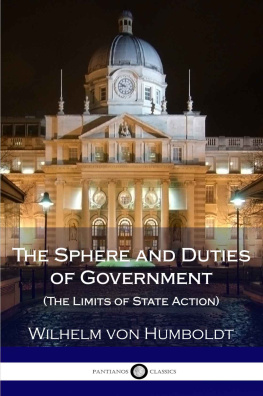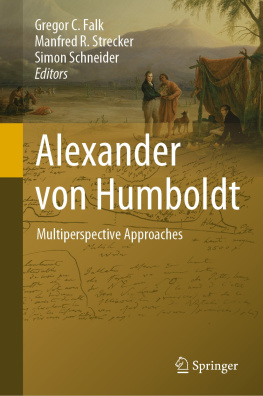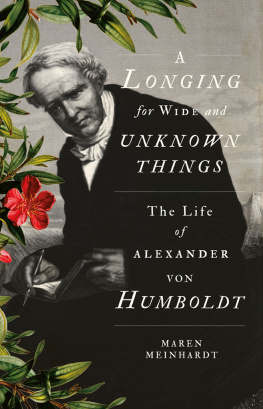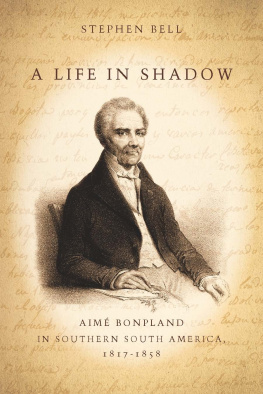
PERSONAL NARRATIVE
ALEXANDER VON HUMBOLDT was born on the family estate at Tegel in Berlin in 1769. With his elder brother Wilhelm he was educated by tutors and then at Frankfurt, Gttingen and Hamburg Universities where he studied botany, literature, archaeology, electricity, mineralogy and the natural sciences. In 1790 he travelled abroad and published his first works in botanical and chemical journals. While at Jena he befriended Goethe. He worked in the Prussian Mining Administration until his mother died in 1796. A large inheritance enabled Humboldt to travel; after a few frustrations he was allowed by Charles IV of Spain to travel in the Spanish American colonies at his own expense, with his companion Aim Bonpland. After five years in the New World (17991804) Humboldt settled in Paris to begin publishing his encyclopaedic Relation historique du voyage aux rgions quinoxiales du nouveau continent, finally completed in thirty volumes in 1834, where the Personal Narrative comprised volumes 28 to 30. Humboldt was not only a prominent figure in the Parisian scientific world but also Chamberlain to Friedrich Wilhelm III, and Councillor of State to Friedrich Wilhelm IV. In 1829 he travelled to Russia and Central Asia and published his account in French in 1843. In 1834 he began his comprehensive survey of creation, Kosmos, completed posthumously in 1862. He died in 1859, a bachelor, and was buried in the family vault at Tegel, honoured as one of the great speculative scientific travellers of the nineteenth century.
JASON WILSON was born in Mauritius in 1944, was a lecturer at Kings College, London, and is currently Reader in Latin American Literature at University College, London. He has published Octavio Paz: A Study of his Poetics (1979), Octavio Paz (1986), An AZ of Latin American Literature in English Translation (1989), the Travellers Literary Companion to South and Central America (1993) and essays on W.H. Hudson, Charles Darwin, Julio Cortzar and Latin American poetry. He is currently working on scientific and literary travellers in Latin America.
MALCOLM NICOLSON was born in 1952 and is a Senior Research Fellow in the Wellcome Unit for the History of Medicine, University of Glasgow, having formerly been Wellcome Lecturer in the History of Medicine, University of Edinburgh. A graduate of the University of Aberdeen, he wrote his Ph.D. thesis on the history and sociology of plant ecology in the Science Studies Unit, University of Edinburgh. He has also worked in the University of Canterbury, Christchurch, New Zealand and the Wellcome Institute, London, and is an honorary member of the Department of Science and Technology Dynamics, University of Amsterdam. His main research interest is currently the development of diagnostic practice but he continues to work on the history of ecology and environmental thought.
ALEXANDER, VON HUMBOLDT
Personal Narrative
Abridged and Translated with an Introduction by
JASON WILSON
and a Historical Introduction by
MALCOLM NICOLSON

PENGUIN BOOKS
Published by the Penguin Group
Penguin Books Ltd, 27 Wrights Lane, London w8 5TZ , England
Penguin Books USA Inc., 375 Hudson Street, New York, New York 10014, USA
Penguin Books Australia Ltd, Ringwood, Victoria, Australia
Penguin Books Canada Ltd, 10 Alcorn Avenue, Toronto, Ontario, Canada M4V 3B2
Penguin Books (NZ) Ltd, 182190 Wairau Road, Auckland 10, New Zealand
Penguin Books Ltd, Registered Offices: Harmondsworth, Middlesex, England
Relation historique du voyage aux rgions quinoxiales du nouveau continent first published 181425
This translation published in Penguin Classics 1995
Abridgement, translation, introduction and notes copyright Jason Wilson, 1995
Historical introduction copyright Malcolm Nicolson, 1995
All rights reserved
The moral right of the translator and the author of the Historical introduction has been asserted
Map on pages by Nigel Andrews
Except in the United States of America, this book is sold subject to the condition that it shall not, by way of trade or otherwise, be lent, re-sold, hired out, or otherwise circulated without the publishers prior consent in any form of binding or cover other than that in which it is published and without a similar condition including this condition being imposed on the subsequent purchaser
ISBN: 9781101491850
CONTENTS
HUMBOLDTS ROUTE, 17991804
HISTORICAL INTRODUCTION
In a few hours we sail round Cape Finisterre. I shall collect plants and fossils and make astronomic observations. But thats not the main purpose of my expedition I shall try to find out how the forces of nature interact upon one another and how the geographic environment influences plant and animal life. In other words, I must find out about the unity of nature.
Alexander von Humboldt wrote these words on 5 June 1799, sitting in his cabin on the corvette Pizarro, in the Spanish port of La Corua. He was writing farewell letters to his friends as the ships company made final preparations for the crossing of the Atlantic. Twenty-nine years old, Humboldt was on the verge of realizing a long cherished ambition to make a journey of scientific discovery in the New World. On 16 July, he and his travelling companion Aim Bonpland landed in Cuman, in what is now Venezuela, to begin their five-year-long exploration of South America.
Humboldt and Bonpland travelled by horseback or on foot, by boat or dugout canoe, over the plains of Venezuela, up and down the Orinoco river, into the Andes, along mountain valleys and passes to Bogot, Quito and Lima, and then by ship to Mexico. They also made voyages to Cuba and to the United States before returning to Europe in August 1804. The successful completion of this adventurous and arduous expedition secured for Humboldt personal fame and consolidated his international scientific reputation. He and Bonpland had gathered an immense scientific and scholarly harvest on the journey huge amounts of information on climatology, geology, mineralogy, terrestrial magnetism, plant geography, zoology, political economy and ethnography, as well as thousands of dried plant specimens. Publishing the results of this expedition was to dominate much of Humboldts remaining career, and to exhaust his private income. The first of a series of thirty volumes appeared in 1807 (or perhaps 1805). The last was not ready until 1834.
Among the more strictly scientific publications of the expedition, Alexander von Humboldt wrote a narrative account of his journey, which he entitled Relation historique du voyage aux rgions quinoxiales du nouveau continent. It appeared in three volumes between 1814 and 1825. Even at three volumes the Relation historique is incomplete a fourth volume was written but never published. When composing the Relation historique, Humboldt sought to encapsulate within the volumes the totality of his experience of South America. He wrote not only for a specialized audience of scientists but for a broader audience of educated lay persons.
The first English translation, Personal Narrative of Travels to the Equinoctial Regions of America, appeared between 1814 and 1829. As well as being an entertaining travelogue, the Personal Narrative provides a useful and accessible introduction to the character and diversity of Humboldts scientific, scholarly and aesthetic concerns. Although he made other scientific journeys, notably to Siberia in 1829, Humboldt always regarded the expedition to the Americas as the most important of his travels. In the New World he had visited the tropical zone where plant and animal life displayed the greatest richness and diversity of form. In the
Next page

